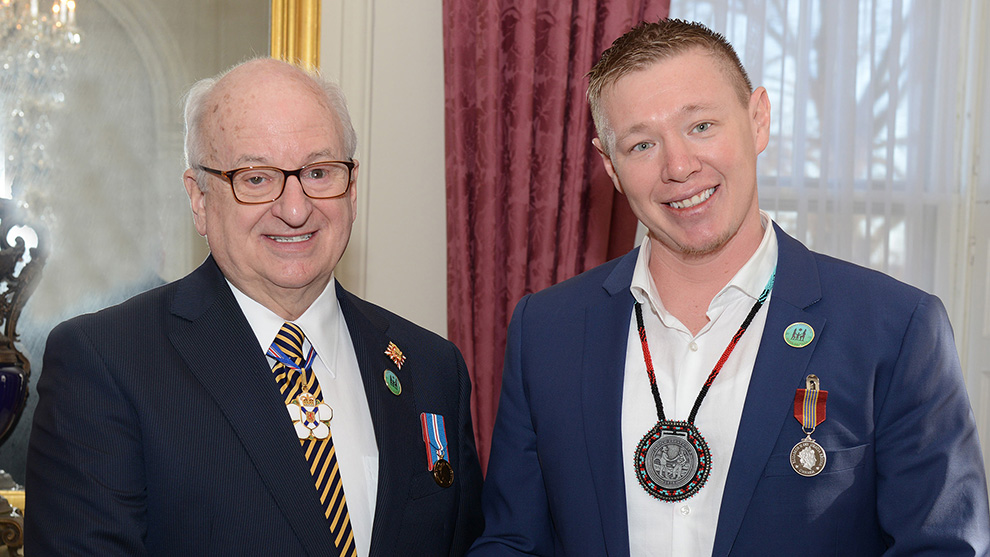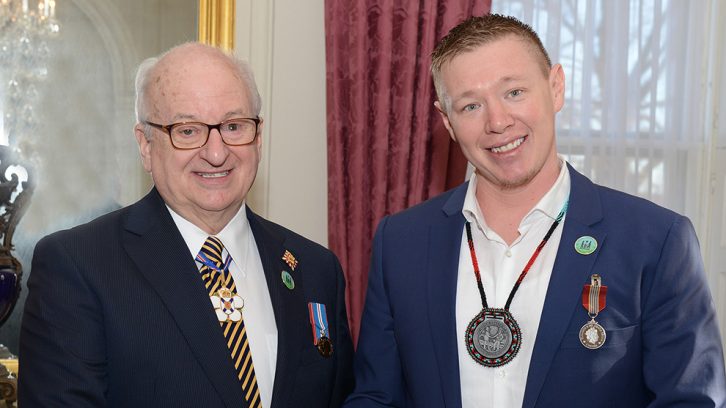Volunteering
Jaime Battiste awarded Sovereign’s Medal for Volunteers
Battiste given award for his work on Mi’kmaq heritage and culture preservation

caption
Jaime Battiste (right) receives the Sovereign's Medal for Volunteers from Lt.-Gov. Arthur J. LeBlanc (left).
caption
Jaime Battiste (right) receives the Sovereign’s Medal for Volunteers from Lt.-Gov. Arthur J. LeBlanc on Thursday.Jaime Battiste may have won a prestigious award for his volunteerism, but he is the first to say that he is only one of many incredible Mi’kmaq activists.
“There’s so many people within my community that are outstanding volunteers,” said Battiste, 38, from the Potlotek First Nation. “I think I might just be one of the more visible people.”
Battiste, who grew up in Eskasoni First Nation in Cape Breton, was given the Sovereign’s Medal for Volunteers by Lt.-Gov. Arthur J. LeBlanc on Thursday at Government House. The medal recognizes activists and volunteers from a wide range of fields.
Battiste is a legal scholar, advocate and activist. Since graduating from Dalhousie Law School in 2004, he has worked as an assistant professor of Mi’kmaq studies at Cape Breton University and served as legal adviser to the Mi’kmaq Grand Council.
Battiste is also the treaty education lead, working for the Mi’kmaq Kina’matnewey. He has published papers and has given talks on the evolution of Indigenous treaty rights and laws.
Battiste’s interest in this kind of work started at a young age. His parents, Marie Battiste and James Henderson, were both awarded National Aboriginal Achievement Awards — Marie Battiste in 2008 for her work in education and Henderson in 2006 for law and justice.
“People look at my achievement, but they don’t always look at the supports I’ve had in my life,” he said. “From a very young age there were a lot of expectations placed on me.”
Through his mother, Battiste learned about the hardships the Mi’kmaq were facing. He studied at Cape Breton University and then at Dalhousie Law School, knowing that furthering his education would expand his ability to advocate for Mi’kmaq people.
In his work, Battiste has contributed to the preservation and understanding of Mi’kmaq culture and heritage. He played a role in the pardoning of Mi’kmaq Grand Chief Gabriel Sylliboy who was convicted in 1927 for a violation of the Lands and Forests Act. Sylliboy was pardoned last February.
Battiste is hopeful his work will continue to make an impact. He said that people have been very receptive of the treaty education he has been doing.
“Over the past two years we have a federal and provincial government that gets the need for reconciliation,” he said.
Although he is busy with his work and advocacy, Battiste enjoys playing music with his band, 2nd Generation, and spending time with his son. Battiste also coaches his son’s football team.
Battiste said he encourages young people to get involved in their communities.
“Getting to be a part of youth advocacy at a very young age teaches you how you can be successful in advocating for yourself and advocating for others,” he said.

